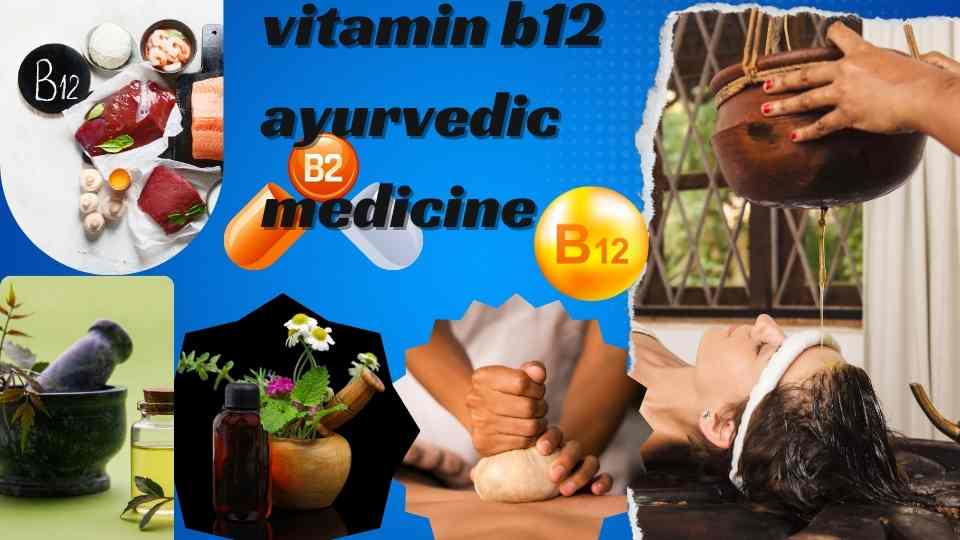vitamin b12 ayurvedic medicine : A Brief Overview of Vitamin B12
Vitamin B12 is a crucial nutrient essential for the proper functioning of the nervous system. Its deficiency can lead to various symptoms, highlighting the importance of maintaining sufficient levels. Ayurveda, an ancient holistic healthcare system, provides numerous natural remedies and dietary adjustments to address vitamin B12 deficiency.
Ayurvedic Approach to Vitamin B12 Deficiency
When the body fails to absorb or produce sufficient vitamin B12, it results in a deficiency. While most individuals obtain an adequate amount of vitamin B12 from their diet, those adhering to strict vegetarian or vegan diets face a higher risk of deficiency since animal products are the primary sources of this vitamin.
Understanding Ayurveda: Basics and Principles
In Ayurvedic Medicine, Vitamin B12 holds significant importance for maintaining optimal bodily functions. It plays a crucial role in red blood cell production, bolstering the immune system, and sustaining nerve function and energy metabolism. Ayurveda regards it as a fundamental nutrient contributing to longevity and the holistic well-being of the body, mind, and spirit.
While Ayurvedic dietary recommendations prioritize a balanced intake, focusing on plant-based foods like fresh vegetables, fruits, whole grains, and legumes, certain herbs are utilized to enhance levels of both vitamin D and vitamin B12. Punernava powder and Ashwagandha powder are commonly employed to address vitamin D deficiency, while remedies for vitamin B12 deficiency often include Turmeric milk and Amla juice.
From an Ayurvedic perspective, the doshas—vata, pitta, and kapha—govern the body’s metabolic processes. Vitamin D correlates with vata, whereas vitamin B12 aligns with pitta and kapha. Ayurvedic approaches to treating vitamin B12 deficiency prioritize dosha balance and overall wellness, encompassing support for the nervous system, immune system enhancement, and digestive health improvement.
In summary, Ayurvedic Medicine underscores the significance of maintaining adequate levels of vitamin D and vitamin B12 through a balanced diet and herbal supplementation. The treatment of vitamin B12 deficiency in Ayurveda revolves around harmonizing the doshas and fostering comprehensive well-being.
Importance of Vitamin B12
Vitamin B12 is vital for the production of white blood cells, crucial for a robust immune system. It defends against harmful molecules, supports the growth of healthy immune cells, enhances metabolism, fosters vitality, aids in detoxification, and strengthens the immune system.
Vitamin B12 is a vital nutrient with significant roles in nerve function, DNA synthesis, and red blood cell production. In Ayurvedic medicine, it’s acknowledged as essential, and several plant-based supplements are suggested to address vitamin B12 deficiency naturally. Herbs like Brahmi and Shatavari are endorsed in Ayurveda for averting vitamin B12-related complications.
Ayurvedic methods for enhancing vitamin B12 levels often include dietary suggestions that incorporate vegetarian sources rich in B12, such as dairy products, eggs, and fermented foods. Moreover, specific herbs like Punarnava are thought to elevate vitamin B12 levels in the body and are considered natural remedies for addressing vitamin B12 deficiency.
In general, Ayurvedic medicine offers a holistic and natural method for addressing vitamin B12 deficiency and enhancing overall health. It’s essential to seek guidance from a certified Ayurvedic practitioner before introducing any new supplements or herbal treatments.
Role of Vitamin B12 in the Body
Vitamin B12 plays a vital role in producing white blood cells, which are essential for a robust immune system. It protects against harmful substances, supports the growth of healthy immune cells, enhances metabolism, promotes energy and vitality, aids in detoxification, and strengthens your immune system.
Ayurvedic Perspective on Vitamin B12
Insights Ayurveda Regarding Vitamin B12from
Vitamin B12, a vital B-complex vitamin, plays a crucial role in nervous system function, DNA synthesis, and cell division. In Ayurvedic medicine, vitamin B12 deficiency may stem from factors like poor diet, digestive disorders, and certain medical conditions. Ayurvedic approaches to addressing vitamin D and B12 deficiencies often include dietary modifications, herbal remedies, and other therapies. However, it’s important to note that vitamin B12’s properties and functions are external to the Ayurvedic system, and there’s no evidence of its presence in Ayurvedic medicinal plants. Therefore, Ayurveda emphasizes a blend of pancham analysis (five elements analysis) and vijnana analysis (five elevations) to manage vitamin B12 deficiency. Maintaining optimal levels of vitamin B12 in the body typically requires following a balanced and varied diet rich in animal products or supplements.
To summarize:
- Ayurvedic medicine acknowledges the significance of vitamin B12 for nerve health, DNA synthesis, and cell division. Deficiency in vitamin B12 may arise from inadequate diet, digestive issues, or specific medical conditions.
- Ayurvedic methods to enhance vitamin D and B12 often encompass dietary adjustments, herbal remedies, and additional therapies.
- Vitamin B12’s attributes and functions originate entirely from outside the Ayurvedic system, and there’s no evidence supporting its presence in Ayurvedic medicinal plants.
- Ayurveda advocates a blend of pancham analysis (five elements analysis) and vijnana analysis (five elevations) to address vitamin B12 deficiency.
- Maintaining optimal vitamin B12 levels requires adherence to a balanced and diverse diet rich in animal products or supplements.
Read More Blog Posts HERE
Subscribe to My whatsapp Channel HERE

